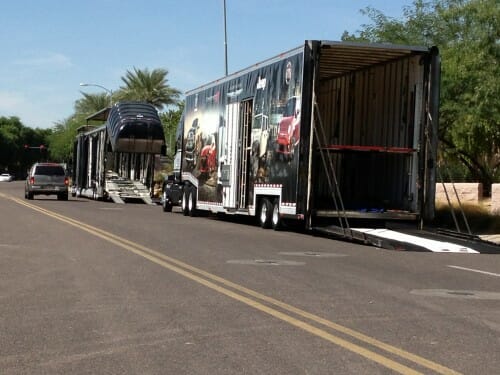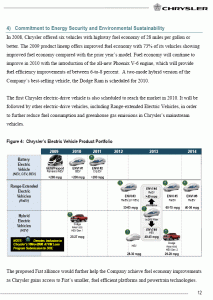Finem Respice has a great post on the Administration's bare-knuckle tactics in trying to enforce its will (against the dictates of bankruptcy law) on Chrysler:
It should be obvious to most observers that, recent allegations of strong-arm tactics in negotiations with Chrysler creditors notwithstanding, given the current situation the White House shouldn't need to resort to anything so openly thuggish as naked threats issued by the likes of Steven Rattner. Assuming for a moment, and for the purposes of conversation, that the allegations are substantially true (and I believe they are), the fact that a bit of Chicago-style thuggery seems to have been required- and seems to have failed- says a lot about this White House. It also says quite a bit about the wild overconfidence intrinsic in the administration and how entirely unused to being denied their will are the senior members thereof. A more deft executive need not have pushed so hard, or rattled the saber of class warfare so loudly, but then a more deft executive would not have expected so much....
There are three things that are scarier than the actual resort to common thuggery. The ease with which it comes to this administration. The ubiquitous and rank ineptitude that makes a resort to thuggery necessary in the first place- and promises it will become a common tactic in the days to come. And the forgiveness the population regularly affords the administration after one or another of these episodes is, yet again, made public.
The tantrums that follow missed targets sketch an interesting family portrait of a class of politically spoiled children, think Hillary Clinton meets Paris Hilton- totally devoid of real executive experience but somehow still used to getting their way no matter what some silly law book says. I believe I'll take my chances with the "speculators" over these alternatives any day, particularly when the spoiled children have the 82nd Airborne Division in their toy chest.
When Obama, who has no real experience with bankruptcy or really with any business enterprise, attempts to substitute for a bankruptcy judge, we have to ask ourselves why. He certainly does not have as much experience or expertise. He has no particular unique knowledge of the business. The only unique "quality" Obama has that a bankruptcy judge does not is that Obama does not feel bound by bankruptcy law. The only possible reason for his involvement is to substitute his desired outcome for the one that would result from the normal application of contract law and bankruptcy precedents. Since this is an inherently political process, it should not be surprising that at its core, Obama's actions are meant to promote the interests of a politically important Democratic constituency at the expense of a group of bondholders he is confident he can portray to the public as unsympathetic.
Megan McArdle said it quite well:
For the record, I have no problem with whatever cramdown those debtholders--or any others--get in bankruptcy court. If the judge thinks that the reorganization can't be done without making the UAW basically whole, fine. I just think that the reorganization should be done under the well-established procedures of the bankruptcy court, not at the behest of an administration trying to reward its supporters.
It's all very well to say that most of the senior lenders are going along, but of course, the leading senior lenders are doing this because the administration has them over a barrel. I think most of the people enthusing about this actually recognize that in other countries, when the government uses the banking system as a slush fund to reward its constituencies, this generally turns out badly--and makes the banking system a lot more frail.
Nor will it fly to claim that the administration's threats--and note that Perella Weinberg has most carefully not denied that they were threatened--are just standard jawboning. Standard jawboning does not involve the White House bloody press corps. It is true that DIP financiers often get to demand serious concessions from creditors, but those creditors are limited by what those creditors would get out of a recession, and are aimed at either maximizing enterprise value, or maximizing the likelihood that the loan will be repaid. This deal does neither.
Perhaps it's idealistic of me, but the American bankruptcy system actually works very, very well. I think we should be very cautious about mucking with it, particularly when there's no reason to. The administration didn't need to beat up the creditors in order to reorganize the company--or at least, they wouldn't have needed to do so, if they weren't trying to make the creditors take less than they'd get in a liquidation. Nor did it need to do so to keep the UAW at the table--unlike capital, the UAW isn't going anywhere. The administration is beating up the creditors because a) it wants to give the UAW a much better deal than they'd get in liquidation and b) they'd like someone else to pay for it.
Update: More of the same coming out (as I predicted here):
Although the focus has so been on allegations that the White House threatened Perella Weinberg, sources familiar with the matter say that other firms felt they were threatened as well. None of the sources would agree to speak except on the condition of anonymity, citing fear of political repercussions.
The sources, who represent creditors to Chrysler, say they were taken aback by the hardball tactics that the Obama administration employed to cajole them into acquiescing to plans to restructure Chrysler. One person described the administration as the most shocking "end justifies the means" group they have ever encountered. Another characterized Obama was "the most dangerous smooth talker on the planet- and I knew Kissinger." Both were voters for Obama in the last election.
One participant in negotiations said that the administration's tactic was to present what one described as a "madman theory of the presidency" in which the President is someone to be feared because he was willing to do anything to get his way. The person said this threat was taken very seriously by his firm.
The White House has denied the allegation that it threatened Perella Weinberg.


